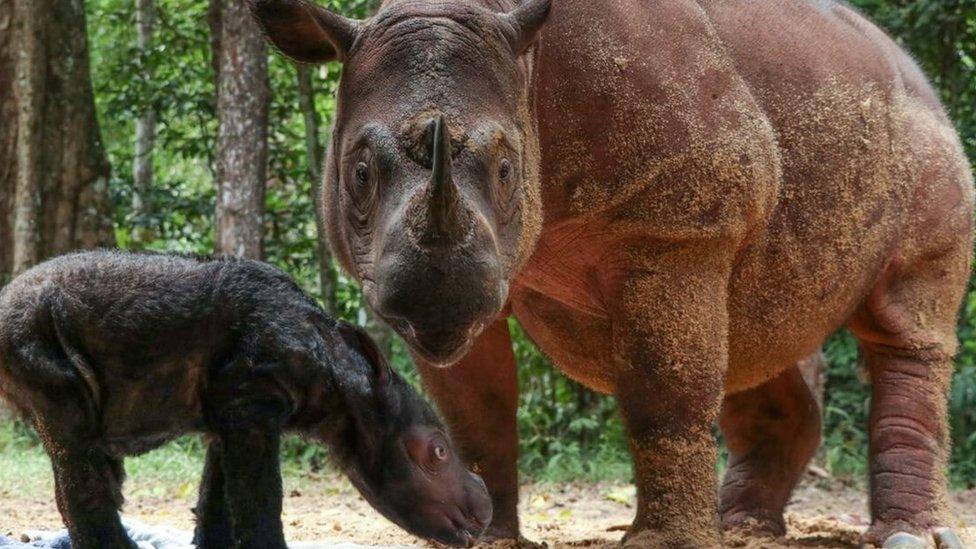A rare Sumatran rhino has been born!
- Published
- comments

The rhino was born to Rosa who has been at the sanctuary since 2005
There's some good news for a special species of rhino which has seen a big drop in numbers over the last 20 years.
A Sumatran rhino has given birth to a calf at an animal sanctuary in Indonesia.
The rhino, named Rosa, had her baby at the Way Kambas National Park in Sumatra. She was brought to the park from the wild in 2005 as part of a breeding programme.
The birth is a big deal for the species, as Sumatran rhinos are currently classed as critically endangered animals and successful births don't happen often.
Rosa has struggled to successfully birth a calf since entering the sanctuary over 15 years ago. The new calf's father, named Andatu, was the first Sumatran rhino to be born in a sanctuary in more than 120 years!
Sumatran rhinos are the hairiest of the remaining five rhino species.
The length of their hair can be very different depending on where they live, from a shorter more spikey coat which rhinos in the wild often have, to a thicker longer coat for those in captivity.
This is because there is less friction caused by the vegetation which rhinos in the wild may often encounter and rub against when searching for food.
The World Wide Fund for Nature (WWF) believe there to be fewer than 80 Sumatran rhinos left in the world. The animals, which are the smallest of all the living species of rhino, are found on the Indonesian islands of Sumatra and Borneo.
"The birth of this Sumatran rhino is such happy news amid the government's and partners' efforts to increase the population," Wiratno, a senior official at Indonesia's environment ministry, said in a statement.
The birth of the calf, which hasn't been given a name just yet, brings the total number of Sumatran rhinos in the Way Kambas sanctuary to eight.
Watch Defending the Rhino: A Newsround Special
Why are Sumatran rhino numbers so low?
The Sumatran rhino is the smallest of all the remaining species
The Sumatran rhino was once found in a number of different countries throughout Southeast Asia including Thailand, Myanmar and Malaysia. The last male rhino in Malaysia died in 2019 with the last female passing away just a few months after.
Today, the animals can only be found in Sumatra and Borneo.
Various threats have almost led the species to extinction, including poaching and climate change. Rhino horn is often illegally traded for traditional Chinese medicine. It's also seen as status symbol in countries such as Vietnam.
- Published29 May 2019
- Published11 May 2016
- Published11 May 2016
